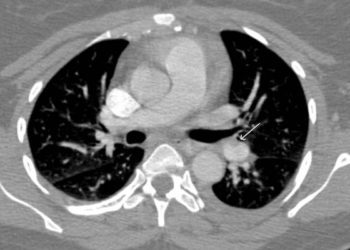Prophylactic penicillin and reduced septicemia in sickle cell patients [Pediatrics Classics Series]
Image: PD
1. This randomized, placebo-controlled, double-blinded trial demonstrated an 84% reduction in the incidence of pneumococcal septicemia among patients with sickle cell taking prophylactic penicillin when compared to those taking placebo.
2. Fifteen severe, Streptococcus pneumoniae-related infections occurred during the study with 13 occurring in patients taking placebo, 3 of which resulted in death. No patients taking prophylactic penicillin died during the study course.
Original Date of Publication: June 1986
Study Rundown: As children with sickle cell are known to be at increased risk for severe, often deadly septicemia secondary to Streptococcus pneumoniae, this study investigated the use of oral penicillin prophylaxis to prevent pneumococcal sepsis. Previous research had indicated the potential benefit of penicillin injections in decreasing pneumococcal septicemia in patients with compromised splenic function; however, no controlled trial of oral penicillin had been completed. This multicenter, randomized, double-blinded, placebo-controlled trial compared the use of twice daily penicillin to placebo vitamin C tablets using serious infection secondary to Streptococcus pneumoniae as the primary endpoint and was terminated early on account of the clear benefit of the treatment. In total, 15 cases of pneumococcal sepsis were reported, of which 13 cases occurred in patients taking placebo. Of note, 3 placebo-treated patients died from their infections. This study initiated the recommendation for all patients to be screened for sickle cell at birth and, for those found to be positive, to have prophylactic penicillin therapy initiated in conjunction with pneumococcal vaccination. Now, twice daily penicillin prophylaxis from 3 months of age through 5 years old is recommended, although whether or not to stop at 5 years of age is controversial.
Click to read the study in The New England Journal of Medicine
In-Depth [multicenter, randomized, double-blinded, placebo-controlled clinical trial]: A total of 215 children with sickle cell disease diagnosed on hemoglobin electrophoresis and aged 3 to 36 months were recruited from 33 clinical centers and included in final analysis. Recruitment started in August 1983 and ended in February 1985. Participants needed to be asymptomatic at the time of enrollment and were randomized to receive either 125mg of penicillin V potassium two times daily or a placebo of 50mg vitamin C tablets twice daily. Patients were seen by a practitioner on study enrollment and then every 3 months. At each visit, patients were examined, had a complete blood count drawn, had their pills counted, and underwent penicillin-sensitive urine testing (to ensure compliance). Patients were nasopharyngeal swabbed for pneumococcal antibodies. While the purpose of this study was not to evaluate the efficacy of the pneumococcal vaccination, patients required vaccine administration and were given the first dose at 1 year of age and then at 2 years of age. The primary endpoint of the study was a severe infection such as bacteremia, meningitis, or pneumonia resulting in hospitalization secondary to S. pneumoniae with a severe infection due to any other organism considered a secondary endpoint.
The study was concluded 8 months earlier than planned after 15 episodes of pneumococcal septicemia were reported, with 13 cases among patients taking placebo and 2 among those taking penicillin. These were the only S. pneumoniae-related infections and amounted for an 84% reduction in pneumococcal septicemia with significantly less penicillin-treated patients experiencing S. pneumoniae infections compared to those on placebo (p < 0.005). Three of the placebo-treated patients died as a result of their pneumococcal infection, despite all having been vaccinated according to the recommended regimen. No children receiving prophylactic penicillin died from infectious causes during the trial. No adverse effects of the treatment were noted.
© 2013 2minutemedicine.com. All rights reserved. No works may be reproduced without expressed written consent from 2minutemedicine.com. Disclaimer: We present factual information directly from peer reviewed medical journals. No post should be construed as medical advice and is not intended as such by the authors, editors, staff or by 2minutemedicine.com. PLEASE SEE A HEALTHCARE PROVIDER IN YOUR AREA IF YOU SEEK MEDICAL ADVICE OF ANY SORT.





